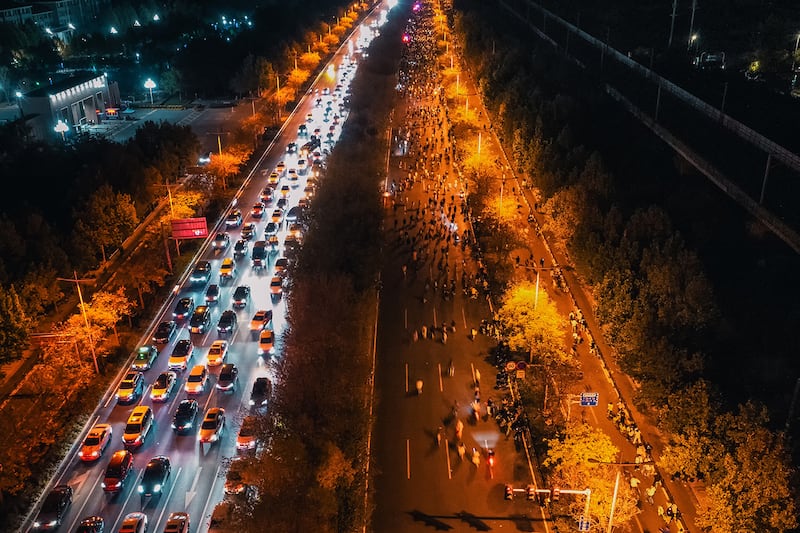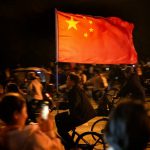Yitong Wu and Kit Sung for RFA Cantonese2024.11.14
Recent mass night bike-rides across central and northern China weren’t an overt form of political protest, but rather a way to let off steam for the country’s struggling young people, who saw it as a brief taste of freedom from their restricted lives, observers and commentators said.
In a video widely circulated on social media, one young man who said he took part said many riders were looking for a way to make some memories with a temporary escape from the pressure and stresses of their lives.
He said the rides were originally conceived as a cheap way to have fun by college kids looking for a summer jaunt on a tight budget, using ubiquitous hired bikes from urban schemes.
“If we could afford to buy motorcycles or cars, there’s no way we would be riding hired bikes,” the man said in a social media video posted as the authorities began a nationwide clampdown on mass riding activities, apparently fearing a possible re-run of the 2022 “white paper” movement that triggered the end of COVID-19 restrictions.
“We’re too poor to go on vacations, to socialize or to go abroad, or to take part in sports activities at a high level,” he said. “We’re so poor that the best we dare to hope for is a bowl of dumpling soup after a midnight bike ride.”
He said young people are expected to show absolute obedience to those in authority, yet have no job opportunities to show for it.
“We’ve done as we were told for more than 20 years now, and we’ll likely have to go on doing as we’re told for the rest of our lives,” the man said. “And yet most of us will likely only make about 3,000 yuan (US$415) a month even after we graduate, and somehow get by on that for a lifetime.”
“I don’t want to grow old without a single thing worth remembering,” he said. “We’re not getting any younger, so that’s why we do stuff like this.”

The night-cycling craze went viral after the first group of young women made the night trip on hired bikes to Kaifeng in June, was widely reported by official media as a boost to the “night-time economy.”
“These youthful adventures embody a vibrant spirit — full of curiosity, determination, and a zest for discovery — that adds new dimensions to the tourism industry,” the People’s Daily online edition gushed in a Nov. 7 article on the craze.
“Far from being just a passing fad, this movement reflects a generation that craves flexible and diverse lifestyles despite their busy schedules,” the article said. “It also highlights the resilience and adaptability of China’s economy, flourishing as it evolves alongside the aspirations of its young people.”
‘They find a way to vent\’
But shortly after hundreds of thousands of people turned out on a ride on Nov. 8, including politically sensitive groups like People’s Liberation Army veterans, the authorities clamped down on the gatherings, placing students across northern China under lockdown in their university campuses.
According to a post on the blogging platform Botanwang, students were hauled back to campuses and kept in their classrooms for several hours after the clampdown on the mass bike rides began, and given a movie to watch before being finally allowed to return to their dorms.
Luis Liang, a young graduate who recently graduated from a university in China and has since migrated to Germany, said he could relate to the students\’ accounts of their bike rides.
“What he said is true,” Liang told RFA Mandarin in a recent interview, in a reference to the young man’s video. “Unless you come from a powerful family … all you have if you don’t go to college is the prospect of doing work that isn’t fit for human beings to try to earn a living. Even if you do, what can you learn from the suffocating education that you get in a Chinese university?”
“They’re desperate, and they can’t see any way to better themselves, so they find a way to vent,” he said.
He said the majority of young Chinese people aren’t generally thinking about challenging the ruling Chinese Communist Party.
“Freedom is a luxury that they daren’t even think about, so they try to do as they’re told and work hard,” Liang said. “If they could just improve their lives and those of their families just a little bit, they’d be happy, and wouldn’t dream of challenging the government.”
“But in today’s China, they can’t even fulfill those humble goals, so they’ve had enough,” he said.
“This kind of protest can fuel hope and encourage other young people, yet the authorities will suppress it and spend a lot of money on maintaining stability, even if they know that it doesn’t actually pose any kind of threat,” he said.
Wu Renhua, who was present at the student-led pro-democracy protests on Tiananmen Square in the spring and early summer of 1989, said the night rides to Kaifeng didn’t appear to have the same kind of focused agenda that was seen among young people around the country in the late 1980s.
“These cycle rides may not have amounted to a movement this time around, but there’s no guarantee that that won’t happen next time,” Wu said. “The college students of today aren’t like those of 1989, but you can still get demonstrations.”
He said the government is very nervous about any large gathering of people.
“If anything changes China, it’ll be a mass movement caused by something other than politics, or at least it won’t be political at the beginning,” Wu said.
“Everyone’s dissatisfaction with the system has been suppressed for so long that people will start out just connecting with each other via non-political gatherings,” he said.
“But once people start gathering, someone could suddenly start raising political demands.”
Translated by Luisetta Mudie.


